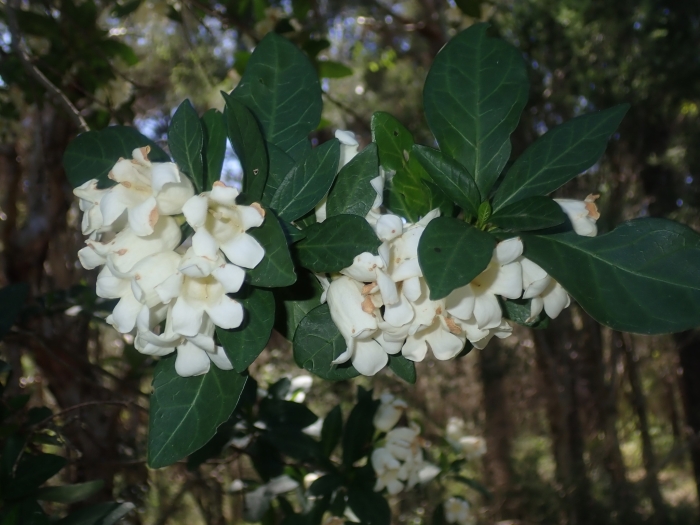September Bells
(Rothmannia globosa)
September Bells (Rothmannia globosa)
/
/

© Thomas Mesaglio
CC BY 4.0
Image By:
© Thomas Mesaglio
Recorded By:
Copyright:
CC BY 4.0
Copyright Notice:
Photo by: © Thomas Mesaglio | License Type: CC BY 4.0 | License URL: http://creativecommons.org/licenses/by/4.0/ | Uploader: thebeachcomber | Publisher: iNaturalist |

























Estimated Native Range
Summary
Rothmannia globosa, commonly known as September Bells or Bell Gardenia, is a small, evergreen tree native to the understory of evergreen forests and forest margins in parts of Southern Africa, including the Eastern Cape to Limpopo Province and Eswatini. It typically grows to a height of 3-8 meters with a similar spread, featuring a dense, rounded crown. The bark is greyish-brown with distinctive rectangular markings, and the foliage consists of glossy, dark green leaves that often display yellowish to maroon veins. From late spring to early summer, it produces highly fragrant, bell-shaped white flowers with a soft pink to purplish tinge, which are followed by spherical, fleshy fruits about 1 inch in diameter.
September Bells is appreciated for its year-round ornamental appeal, especially the showy, fragrant flowers that attract pollinators. It is used in gardens and landscapes for its compact size and as a specimen tree in small gardens or as part of mixed borders. In cultivation, it requires well-drained, humus-rich soil and thrives in part shade to full sun conditions. Regular watering is necessary, especially during dry periods, to maintain its lush appearance. While generally pest-free, it can be susceptible to root rot if overwatered or planted in poorly drained soils.CC BY-SA 4.0
September Bells is appreciated for its year-round ornamental appeal, especially the showy, fragrant flowers that attract pollinators. It is used in gardens and landscapes for its compact size and as a specimen tree in small gardens or as part of mixed borders. In cultivation, it requires well-drained, humus-rich soil and thrives in part shade to full sun conditions. Regular watering is necessary, especially during dry periods, to maintain its lush appearance. While generally pest-free, it can be susceptible to root rot if overwatered or planted in poorly drained soils.CC BY-SA 4.0
Plant Description
- Plant Type: Tree, Shrub
- Height: 10-15 feet
- Width: 6-10 feet
- Growth Rate: Moderate
- Flower Color: White
- Flowering Season: Summer, Fall
- Leaf Retention: Evergreen
Growth Requirements
- Sun: Part Shade
- Water: Medium
- Drainage: Medium
Common Uses
Bird Garden, Butterfly Garden, Fragrant, Hedges, Low Maintenance, Potted Plant, Showy Flowers
Natural Habitat
Understory of evergreen forests and forest margins in Southern Africa
Other Names
Common Names: Wild gardenia, Bell gardenia
Scientific Names: , Rothmannia globosa, Gardenia globosa,
GBIF Accepted Name: